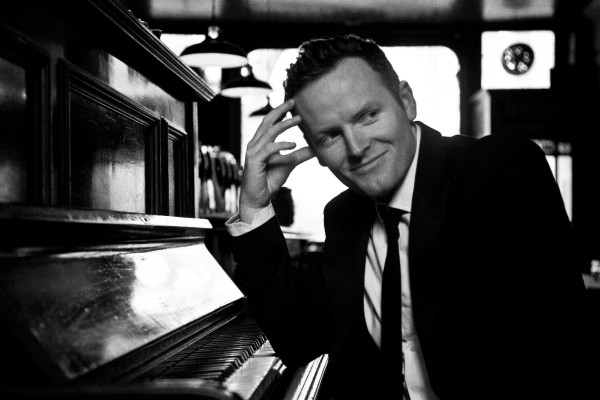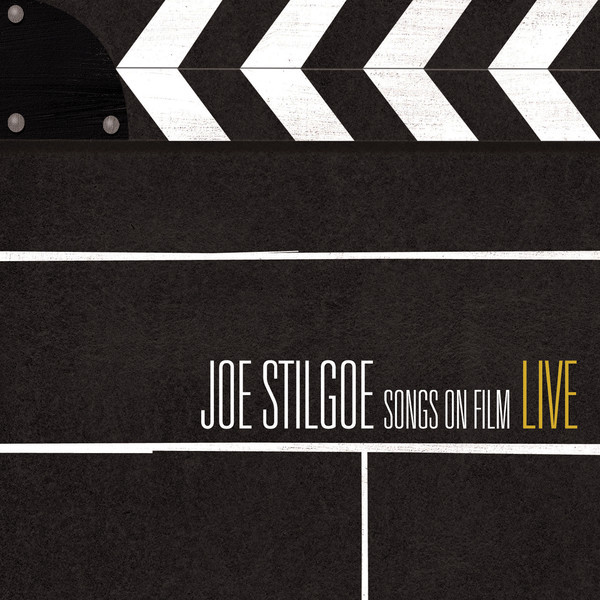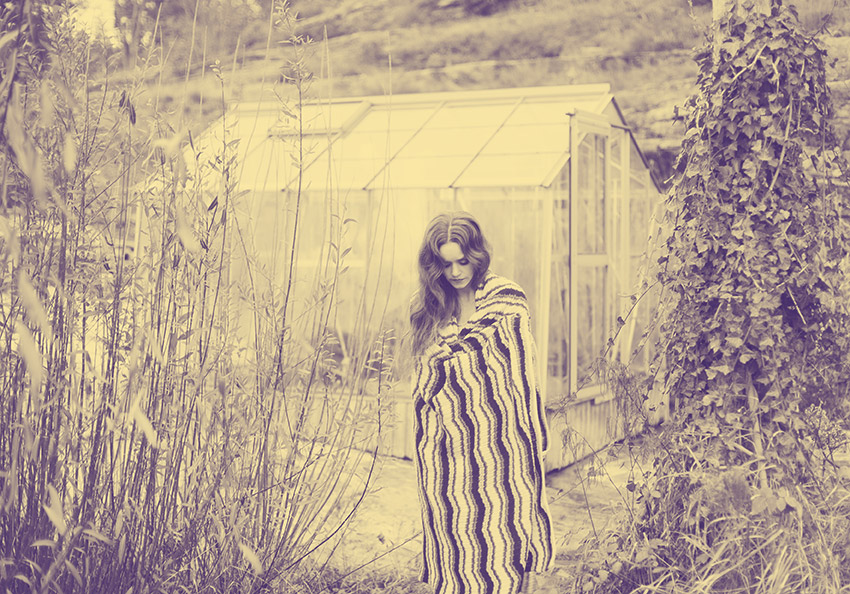A CHAT WITH: JOE STILGOE
aaamusic | On 21, Aug 2014
British pianist, singer, songwriter and film enthusiast Joe Stilgoe is the son of entertainer Sir Richard Stilgoe and opera singer Annabel Hunt. He’s married to actress and director Katie Beard. His album We Look To The Stars, went to number one in the Amazon Jazz Chart. Interviewer Anthony Weightman chatted to him at the Edinburgh Fringe Festival where he’s been performing Songs On Film to rave reviews.
Anthony Weightman: At the moment you’re performing Songs On Film at the Edinburgh Fringe, which pays tribute to a century of Hollywood cinema. Would you like to say a few words about this?
Joe Stilgoe: Yes, it’s been great working away to produce this show in Edinburgh, which is a different sort of festival. It’s not like we can do our normal sort of gig that we can perform in a jazz club or concert hall. We’ve made it a bit more theatrical and cinematic, so when people go away we hope they feel they’ve seen every film they’ve ever loved and heard every piece of music. Obviously, we can’t cover all of them, but there’s a section at the end where we try to cover everything people haven’t heard. But yes, it’s been great.
Anthony Weightman: Watching you practice at home I noticed a film poster from Gentlemen Prefer Blondes above your piano, featuring Jane Russell and Marilyn Monroe. It had the reputation of being a colourful and enjoyable film full of joy, fun, charm, romance and comedy. To you, did that particular film contain many of the elements of good entertainment?
Joe Stilgoe: It did. I was a big Marilyn Monroe fan. The first film I saw her in was The Seven Year Itch, the famous one with the dress. I do love films from that era because there’s an innocence about them that has been lost through satire, not that I’m a particular fan of parody. That era was more simple and in story telling you can get a couple of people who can fall in love in the course of a song, two and a half minutes.
Anthony Weightman: I was looking at a list of pianists that you personally admire: Nat King Cole, Fats Waller, Bill Evans, Keith Jarrett, Erroll Garner, Geoffrey Keezer and Peter Cincotti. I was also thinking of possible words to describe them: creative, inventive, classy, distinctive, original, influential? How would you personally describe the qualities you find appealing in a pianist?
Joe Stilgoe: I suppose it’s that old Duke Ellington word ‘swing’. “It Don’t Mean a Thing (If It Ain’t Got That Swing).” Most people listening to Fats Waller and Erroll Garner would think they were classic swing pianists. Keith Jarrett played with a straighter style but still had that ability to extract every moment of joy from each note. That’s the idea of piano and it’s fascinating that you can get 20 people playing the same instrument and they’ll all make it sound different. But, the one homogeneous streak of marble is ‘swing’ and they have this innate sense of joy. Duke Ellington said that music to him was either good music or bad music.
Anthony Weightman: Robin Williams, the actor and comedian, sadly passed away earlier this week. He was also a great lover of jazz. Personally I thought he was a brilliant entertainer. What are your personal memories of him?
Joe Stilgoe: Well, it’s funny you should say the jazz thing. I was wondering what sort of musician he would have been. I’m sure he played a bit and could hold a tune. We get news so quickly now. I went onto the internet and read some heartbreaking eulogies and heartbreaking accounts and watched some clips. My whole film watching life was ‘book ended’ by Robin Williams, everything from Dead Poets Society, Good Morning Vietnam and Aladdin, to Good Will Hunting. It’s just tragic. I wrote a tweet and asked how it was that someone we think of as one of the best examples of life can find it such a struggle. In actually living. It’s very hard when you see someone who’s bought so much joy, like those jazz pianists. He bought things to life and now he’s gone. It’s so hard to take. It probably hasn’t sunk in for a lot of us.
Anthony Weightman: We also lost Lauren Bacall, the award-winning actress with the husky voice who was central to the golden age of film. Would you like to say a few words about her?
Joe Stilgoe: It’s too much to lose such a legend after Robin Williams. In an ideal world we’d have a bit of a breathing space so we could properly pay tribute. But, Lauren Bacall was one of the few who was still around from that time, who brought with her all those memories of the golden age of Hollywood. That voice is just so amazing, so evocative. Together with her looks, that’s what people remember.
Anthony Weightman: I was curious that Michel Petrucciani, the dramatic French Italian pianist, is a favourite of yours. He was an amazing man because, despite a genetic disease which gave him brittle bones and arms that were constantly in pain, he remained cheerful and very professional. Is that part of the appeal? A musician who was remarkably successful despite the odds being against him?
Joe Stilgoe: Well, funnily enough, the first time I heard him live at one of his last concerts in Paris, I didn’t know about his condition. He is my favourite of all. I could listen to him on a loop. He’s got everything. All those famous pianists you mentioned are in him. Erroll Garner, Fats Waller, Art Tatum, Oscar Peterson and Keith Jarrett. When I found out about his condition, it rang some bells because my Dad has been involved with disabled musicians for some time and set up a residential centre called The Orpheus to provide young disabled adults with a chance to escape their condition and further their music and drama. I’ve been involved with that as well from a young age. There’ve been instances of disability in my own family. You don’t want to dwell on someone’s disability when they can play a piano like that, but his story is very moving. I hope that in his life time people were never discriminatory or took advantage of him because of his condition. He was half the size of a normal adult, so he had his pedals raised so he could reach them. He would not want to be remembered as someone who triumphed through adversity, but I think it makes it all the more special that he was someone who conquered his condition. I will remember and keep spreading the word.
Anthony Weightman: It sometimes happens that comedians are accused of saying things that they shouldn’t. One person says they’ve said something offensive and disrespectful whilst another person doesn’t understand the criticism and defends them for being edgy and adventurous. There’s often a huge controversy and then the whole thing seems to blow over. How do you feel about those sort of situations?
Joe Stilgoe: Interesting. I think with comedy, especially up here in Edinburgh, every comedian is trying to make a name for themselves. Saying something controversial tends to let you leap forward. I don’t want to say anything against that. I don’t like people being offensive about anyone, especially not for laughs. There’s a difference between satire and impoliteness. People can defend them and explain it away, but there’s often some malice behind things that people say. It just makes everyone’s life a bit sadder. Twitter is a place that’s rife with people being attacked and there’s no place for it, really. I’ve never been asked that before, so it’s interesting.
Anthony Weightman: Watching you on the Alan Titchmarch show, I wondered if we might ever also see Joe Stilgoe ‘the novelist’. Is that a possibility?
Joe Stilgoe: That’s interesting as well. Where did that come from? Well, they say everyone has a book in them. But, I have been writing a novel . I had an idea that came to me based on a song title. I can’t say anything because someone will nick it. It’s finding the time, because I’m writing a new album at the moment. To try to fit in the novel is something I’m really looking forward to. I’m about to become a Dad, so perhaps I’ll find the time.
Anthony Weightman: Oh, congratulations!
Joe Stilgoe: Thank you. I’m one of these people who just wants to be involved with everything. Music is everything to me, but it’s a part of other creative things I love. Every time I meet someone or talk to someone I want to be a part of what they’re doing.
Anthony Weightman: Is there one specific piece of advice that stands out as being the most important ever given to you as a musician?
Joe Stilgoe: Well, ‘practice’ is the annoying one word answer to that. For fifteen years I ignored my parents and then decided to do some work. Going back to Robin Williams, my favorite quote from Dead Poets Society is not ‘carpe diem’ (seize the day) but the line after, ‘make your lives extraordinary’. Those four words might sound glib, but I don’t think you can top them. Whatever you do, try to do your best.
Anthony Weightman: Is there anyone you’d like to play with that you haven’t played with so far?
Joe Stilgoe: Yes, everyone. I can’t list those who are no longer with us, who I would have wanted to play with. All those people on the walls in Ronnie Scott’s. Ella Fitzgerald. Miles Davis. Count Basie. Still around, I’d love to play with Stevie Wonder and Wynton Marsalis who’s a huge influence to me.
Anthony Weightman: Can you recall a gig which has been particularly demanding in terms of planning and preparation?
Joe Stilgoe: This one. I wanted this to be an hour where people were expecting something. Being yourself you can take things off in different directions. You have to plan things. Songs On Film has been nearly a year in the making, to get where we are now. A lot of choosing songs, getting rid of them and adding bits to give people a complete hour of entertainment. People will come and there’s no prejudice. It’s just music. It’s me talking about my love of the cinema. I’ve really enjoyed it, though. It’s been a lot of work but it’s been worth it.
Anthony Weightman: I know you’re a Dudley Moore fan. When he passed away, his final words were “I can hear the music all around me.” Can you think of a better way to go?
Joe Stilgoe: Absolutely not. What great final words. For Dudley music was everything. He was not as severe as Petrucciani, but he was born with a disability. There are always reasons why people go into performance or music, but he had a tricky life. Then he got that awful condition later, PSP. He was so embarrassed because he went on a chat show and everyone thought he was drunk. He played a drunk in Arthur and in sketches with Peter Cook, but he actually didn’t drink a huge amount. He tried to convince people he was actually suffering. He tried to delay the announcement that he had this condition. He tried to play Beethoven and Bach every day. The piano playing was everything he had at the end.
Anthony Weightman






